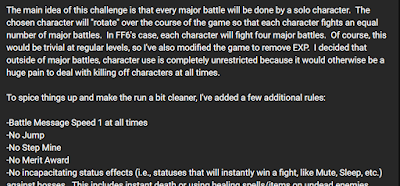Tales of Berseria (2016)
I'm at war with myself on this one. I just slammed out several paragraphs of impassioned complaints (the god-awful fighting, the void of a soundtrack, the interminable length). But, reading it over, it doesn't feel representative of my experience with the game. I was irked constantly playing Tales of Berseria, but the fact is: they got me.
I loved the characters. The size of the script may have ballooned the game length to the point that it took my partner and I five tortured months to get through the game. But it also gave me time to fall in love with everyone. It's a tight cast, with only six playable characters and an economical stock of villains and supporting roles. Everyone gets a big moment, gets their time to shine. Ys VIII came out the same year as Berseria. That game has a more concise script (and infinitely better combat), and as a result it's a more propulsive and overall delightful play experience. But I don't feel anything about Hummel, Laxia, Ricotta. That game is purely Dana's story, whereas I love just about everyone in Berseria.
I loved Tales of Vesperia's cast too though, and while I enjoyed that game in the moment, I cooled on it as time went on. A big difference with Berseria are the stakes. Characters die constantly in Berseria, and (for the most part, sort of, it's complicated) they stay dead. The characters left behind have to process their grief and work to find a way forward from it, and it's all dramatized, all on-screen. It's a story full of loss, and they don't flinch away from that. It's still a firmly PG-13 anime RPG — I wish I could play an R-rated version that leaned into the earned edge even further. But I went into this expecting a Tales game, and for a Tales game this all surprised and satisfied me.
The other thing that worked for me: Berseria stays committed to the scenario it lays out in its impeccable prologue. After the initial episode with the lost water blastia, Vesperia's story wibble-wobbled around incomprehensibly for dozens of hours before arriving at its charming and dramatically limp conclusion. I couldn't tell you what any of the villains wanted, what incompatibility in ideals set the heroes against them. Berseria is extremely precise in comparison (as precise as an RPG this long is capable of being anyway). It's a story about revenge and tearing down a corrupt status quo. Even as the scenario ascends to the god-battling stakes you'd expect from a Tales game, it never loses track of what it's actually about. I think that's commendable.
For a variety of reasons, I don't think Berseria works as an RPG. My brain would dissolve and leak out my ears if I tried to play more than one game like this in a year. But the fighting is over quickly, and it was easy enough for me to enjoy it as a genre-confused visual novel. If you're up for that kind of experience, I think this is a real good one.
Digital Devil Story: Megami Tensei (1987/1995)
Played the Super Famicom version, which is good because I’m pretty sure the Famicom original would’ve killed me.
I enjoyed this! I played through Shin Megami Tensei years ago, so this is my second exposure to classic MegaTen. Unlike SMT, Megami Tensei
is a pure strain dungeon crawler — no overworld here — and pleasingly
open-ended. When I first reached the Minotaur and Medusa, I wasn’t
strong enough to beat them (even after finding Tabasa’s Statue for
Medusa), so I just kept exploring the next area. I back-tracked to
defeat them later. The only hard check that you’ve beat the Tyrants is
once at the very end (at least I think it’s a hard check), so until then
you’re free to approach the major obstacles however you want. This
meant I never needed to grind.
Of course, “I never needed to
grind” is misleading when the exploration is as bone-dry as it is here.
The map designs (which are different from the Famicom version for the
record, I don’t know how they compare) are massive, sprawling, and
largely empty. I would’ve welcomed more Wizardry tricks
honestly. Pits, damage floors, teleporters, and spinners are few and far
between, at least until the last area. Outside of combat threats,
exploring the maze is mostly mindless. I remember Shin Megami Tensei being denser with interesting encounters and dungeon shapes.
The
saving grace is that the combat encounters stay scary the whole game.
Every boss is a monumental event — I actually screamed when Lucifer
finally gave up the ghost. You can never fully relax against regular
enemies either. Just when my characters were getting beefy enough that
party wipes were no longer a real concern, they start throwing level
draining enemies at you. It’s cruel, but I appreciated that the tension
never let up all the way to the end.
The maps are barren, demon
fusion and character progression are dirt simple, and combat isn’t
tactical enough to sustain the game’s ballooned run-time. The game is a
historical artifact in a way Shin Megami Tensei definitely
isn’t. But the central arc of it is still solid. The core journey of
exploring the first dungeon and getting strong enough to beat the
minotaur is as powerful here as it was in SMTIV. Somehow
they’d nailed down all those same fundamentals in the very first game.
I’d rather play a game that’s all bones and no sauce than one that’s all
sauce and no bones.














